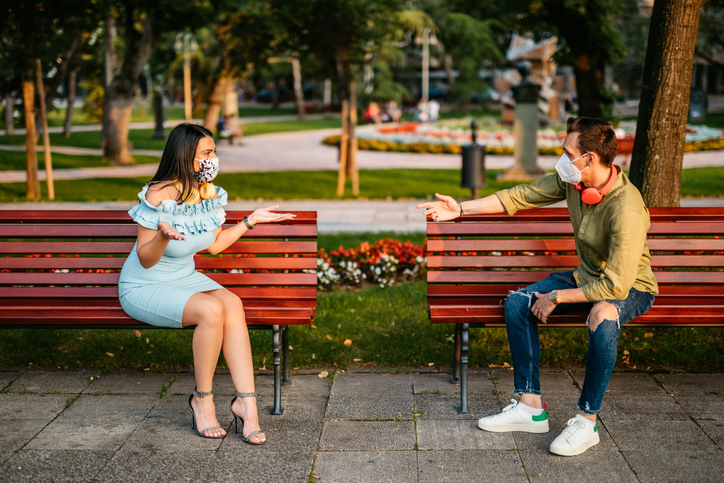By Marisa Markowitz, LMSW, CASAC-T and Daniel Pollack, MSW, Esq.
Updated May 2023
During the coronavirus pandemic lockdowns, dating was a challenge. Safety restrictions created an environment where apps and virtual dates were the only ways to meet new people.
But there was a silver lining: the opportunity to get to know a potential partner in slower, creative ways.
On a virtual date you could see the bookshelf in the background that showed a variety of detective novels and the piano in the corner, waiting to be played. There was something special about seeing another person’s home, up close and personal. The screen became a window to their private world.
There are some advantages to virtual dating. Studies show that virtual dating allows for more quality time with fewer distractions, and it’s cheaper than going out.
Research indicates that getting to know a person on an emotional level without the possibility of physical entanglements can lead to happier, more fulfilling relationships. The pandemic provided a unique opportunity to cultivate these richer connections.
Virtual dating led to countless other activities. Instead of going out to a bar, why not play instruments at home and make a song together? Rather than eating in a restaurant, how about finding a recipe and cooking a meal? Or what about a virtual happy hour?
The bottom line: dating activities could be unique and fun. Zoom, FaceTime, and other virtual platforms allow for these types of interactions. They allowed people to make the most out of an unpleasant situation.
Today, dating might look more like it always has: drinks, movies and dinners. But dating now feels different.
Is it conceivable to know a person with all their quirks, idiosyncrasies, and intentions on a first date? Absolutely not. But given the turbulence and stress of these past few years, questions about political leanings, the importance of getting vaccinated, and quarantine habits are more likely to come up. In fact, you might have a new list of screening questions for sizing up a potential mate.
After all, 2020 was a year unlike any other. Studies indicate that people experienced significant mental health issues during the pandemic. To constantly have to be vigilant about sheltering in place, maintaining six feet distance, and sanitizing hands has been extremely stressful.
It might feel better, or safer, to go back to something more comfortable, like grabbing a drink. This leisurely activity might be a welcome change from talking about the past year.
Tips for Dating After Lockdowns
If you’re ready to date in person or just feel like mingling, here are some helpful tips:
- Create an inventory of the type of person you want to meet. Consider all the personal characteristics that are important to you. If being vaccinated is a priority, keep it in mind.
- If you see warning signs, run! Your safety comes first. There will always be other, more like-minded people.
- If you use a dating app, and there’s an option to display your vaccination status, do so.
- Communicate your feelings. The past few years have been hard, and there were so many mixed emotions. Being vulnerable is a strong predictor for establishing deeper connections. People who want to develop relationships would be better off being open and honest with each other.
- Respect each other’s opinions. If a potential mate says something alarming, don’t take it personally. It merely provides insight into that person’s value system. If their values don’t match yours, agree to disagree and move on.
- Watch body language. Most experts agree that 70 to 93 percent of communications is nonverbal. So try to understand what the person is saying without actually saying it.
- As always, get to know the person beforehand. Have a video chat to provide context for how the person will potentially behave during the date. You’ll discover things like, “Is this person interesting?” and “Is this person willing to get creative and be goofy with me?” A virtual date will help you decide if you want to meet them in person.
Opening Doors
The pandemic’s dating scene was all online for some people; for others it was non-existent. Being adrift for so long was frustrating.
Taking online interactions into real life will ensure that these lessons will not be cast aside as a once-in-a-lifetime coping mechanism. To the contrary, these creative measures will enhance dating for the long run.
What’s the message here? You can cultivate quality relationships through unusual means. Only time will tell if those relationships will survive, but it’s worth putting in the effort.
Alexander Graham Bell said, “When one door closes, another door opens.” As the pandemic slowly recedes into the background, its metaphorical doors are closing.
Opening a new door to a brighter chapter can feel intimidating. Maybe a dance club isn’t in the cards for a first date. And that’s okay. Perhaps you can keep both doors slightly ajar so that you can navigate your way back into romance.

Marisa Markowitz and Daniel Pollack
Marisa Markowitz, LMSW, CASAC-T, is a clinical social worker who works with adolescents and the LGBTQIA+ population. She explores the relationship between excessive technology use and adverse mental health problems, including anxiety and depression.
Daniel Pollack, MSW, Esq, is a professor at Yeshiva University’s School of Social Work in New York City.





